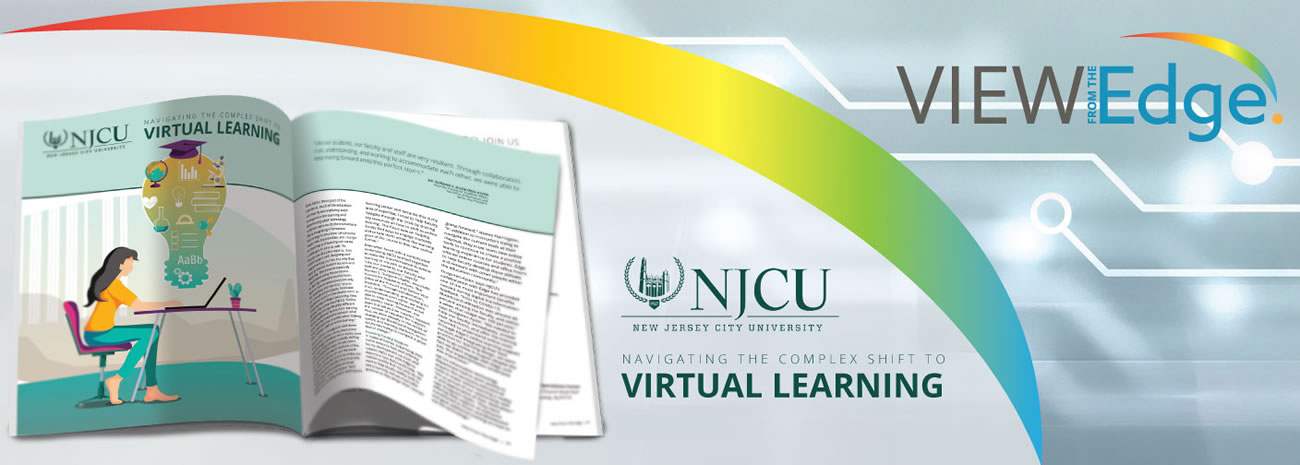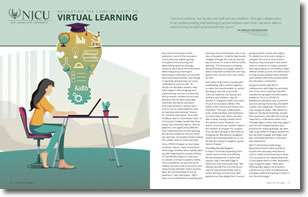Even before the impact of the pandemic, much of the education community was exploring ways to expand online learning and determining which technology solutions were worth the investment. While integrating information technology in education can provide many new opportunities, any change to teaching and learning can cause challenges to arise as well. “As faculty are discipline experts, they need support with designing and implementing courses in a way that best promotes student success and learning. This became especially important during the pandemic as faculty needed to quickly learn how to use an online platform only for teaching and learning,” shares Dr. Christine Harrington, Associate Professor and Co-Coordinator Ed.D. in Community College Leadership, New Jersey City University (NJCU). “Online platforms are significantly different from traditional face-to-face learning and faculty needed to discover what was and was not possible when making the sudden shift to online learning.”
Once COVID-19 began to shut down in-person classes, many institutions’ technology timelines were rapidly sped up, with organizations quickly shifting to find effective ways for educators to connect and teach students online. “As the pandemic hit and the world shifted, everyone had to be online and many faculty members had to quickly learn the functionalities of virtual platforms,” says Harrington. “NJCU does not currently have a teaching and learning center and because this is my area of expertise, I tried to help faculty navigate through the crisis by sharing key resources on how to shift to online learning. The focus was on helping faculty find ways to engage students and to help them achieve the learning goals of the course in this new online format.”
Even when faced with a complicated undertaking, NJCU worked together to make the transformation to online learning as smooth as possible. “Like our students, our faculty and staff are very resilient,” says Dr. Nurdan S. Duzgoren-Aydin, Associate Provost for Academic Affairs, The Office of the Provost and Senior Vice President. “Through collaboration, trust, understanding, and working to accommodate each other, we were able to keep moving forward amid this perfect storm. However, our team is small and we couldn’t support the number of requests for support. Plus, we were already in the midst of changing our Blackboard navigation system and learning platform, so our faculty was trying to navigate a great deal of change.”
Providing Faculty Support
In hopes of further expanding their online resource hub and offering faculty development courses and support, NJCU met with Edge to determine how they could help. “We realized quickly that not only do we need to help faculty swiftly shift to online learning, but we must offer guidance as they design their courses going forward,” shares Harrington. “In addition to instructors trying to navigate the current tools at their disposal, they must learn new online tools to continue to create a positive learning experience for students. Edge offered online courses and office hours to help faculty develop these skillsets and network with other people within the education community.”
Duzgoren-Aydin says NJCU’s collaboration with Edge has provided one of the most important benefits needed during digital transformation: feedback. “Prior to COVID-19, Blackboard utilization was around 40 percent among the faculty, and within a week, that usage was 100 percent,” says Duzgoren-Aydin. “We needed to help our faculty immediately, answer their questions, and offer the training required to understand online tools. Through Edge’s online learning support services and integrating their best practices for learning design, we were able to go online in August despite the fact we didn’t engage with Edge until July. The implementation timeframe was impressive.”
NJCU’s information technology department had to work quickly to acquire the necessary educational tools to make online learning a reality. “I’m so proud of our relationship with IT and appreciative of their dedication,” says Duzgoren-Aydin. “They were offering daily support as everyone transitioned to Zoom and Blackboard and gave additional training on how to use the technology.”
“Going forward, every course should have an online component, even if the class is completely face-to face. We will need to broaden the way we think about online teaching and learning. The learning management system will be important, but since each instructor has a different approach, a variety of support, design, and delivery options will be critical.”
Dr. Christine Harrington
Associate Professor and Co-Coordinator Ed.D.
in Community College Leadership, New Jersey City University

Adapting to Changing Times
As more courses convert to the online learning platform, NJCU is looking at high flex technology and finding solutions based on the feedback from faculty. “As we transition to a new model, instructors want to ensure a quality student learning experience and that learning goals are achieved,” says Duzgoren-Aydin. “Not only will they need technological support, but also help navigating the next steps of high flex technology and understanding student engagement best practices.”
NJCU continues to develop a centralized location for faculty resources and identify ways to improve instructional design to ensure quality online education. “I’d love to connect online learning to an overall teaching and learning center so that we can provide a much more comprehensive, ongoing, and consistent service to faculty,” shares Harrington. “Going forward, every course should have an online component, even if the class is completely face-to face. We will need to broaden the way we think about online teaching and learning. The learning management system will be important, but since each instructor has a different approach, a variety of support, design, and delivery options will be critical.”
Duzgoren-Aydin says the pandemic has revealed the importance of strategic planning and making clear and smart investments. “We continue to listen to our students and faculty and identify the redundant questions and problems to streamline the solutions. The entire education community has to embrace the concept of learning in a new way. We are experiencing a cultural change in a very short period of time. Through this experience, we learned how fragile we are, but also how resilient. Despite the limitations, shortage of funds, and strain on our support staff, we survived and we will emerge stronger and wiser from where our journey started.”
With EdgePro, Edge members have access to Edge’s online program readiness assessment (OPRA) and online learning and instructional technology acceleration (OLITA) program. OPRA is a results-driven five-step methodology designed to identify strengths and weaknesses, provide a gap analysis of an institution’s online learning readiness, and deliver a recommended course of action for online campus development. This includes an in-depth review of the online student lifecycle, business process readiness, instructional design and technology strategy, and will be detailed in a final summative report. OLITA, on the other hand, is a time and team-based professional service project that will build a new online campus, or accelerate existing online learning capabilities. The OLITA methodology will ensure the development of programs designed to meet the unique needs of an online learning community, integrating best practices for learning design, EdTech, infrastructure support, student privacy, and cybersecurity. Ready to accelerate your institution’s ability to deliver online learning? Discover the full range of EdgePro benefits at njedge.net/solutions/edgepro.



